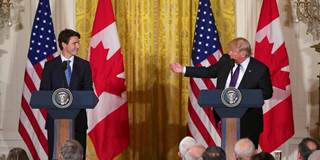Donald Trump’s presidency is posing fundamental challenges to the rule-based international trading system that has buttressed global growth for decades. But while America’s protectionist maneuverings threaten a global trading regime based on legal norms, they may also, paradoxically, help to reform it.
ONTARIO – Donald Trump’s presidency is posing fundamental challenges to the rule-based international trading system that has buttressed global growth for decades. But while America’s protectionist maneuverings threaten a global trading regime based on legal norms, they may also, paradoxically, help to reform it.
That is because middle powers – countries with modest GDPs but global influence – have an opportunity to moderate and reorient Trump’s anti-trade firestorm. Through enhanced cooperation, the world’s middle powers can avoid becoming collateral damage in Trump’s anti-globalization offensive. And they can help to maintain the stabilizing project of international cooperation by advancing a progressive trade agenda based on the rule of law.
Trump’s rejection of the Trans-Pacific Partnership (TPP) by executive order, his promise to renegotiate the North American Free Trade Agreement (NAFTA), and his claim that the World Trade Organization (WTO) is “a disaster,” all foreshadow likely trade tensions. In more ways than one, these could trigger trade conflicts that middle powers would wish to avoid and deescalate.

ONTARIO – Donald Trump’s presidency is posing fundamental challenges to the rule-based international trading system that has buttressed global growth for decades. But while America’s protectionist maneuverings threaten a global trading regime based on legal norms, they may also, paradoxically, help to reform it.
That is because middle powers – countries with modest GDPs but global influence – have an opportunity to moderate and reorient Trump’s anti-trade firestorm. Through enhanced cooperation, the world’s middle powers can avoid becoming collateral damage in Trump’s anti-globalization offensive. And they can help to maintain the stabilizing project of international cooperation by advancing a progressive trade agenda based on the rule of law.
Trump’s rejection of the Trans-Pacific Partnership (TPP) by executive order, his promise to renegotiate the North American Free Trade Agreement (NAFTA), and his claim that the World Trade Organization (WTO) is “a disaster,” all foreshadow likely trade tensions. In more ways than one, these could trigger trade conflicts that middle powers would wish to avoid and deescalate.